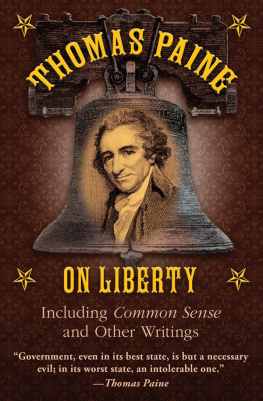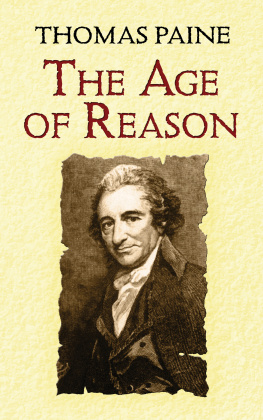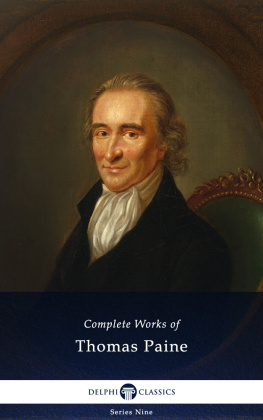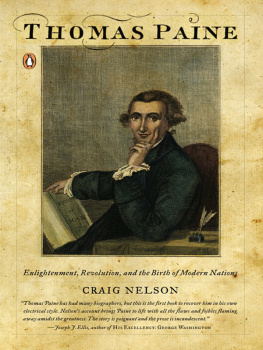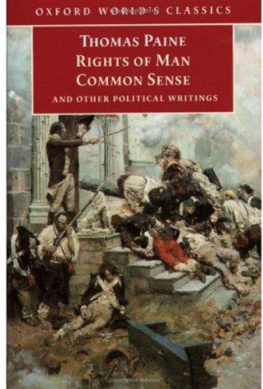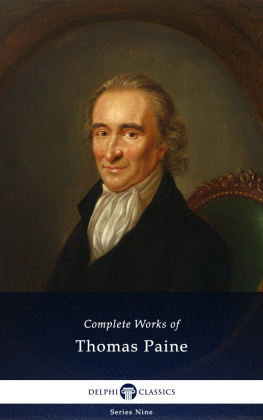Copyright 2018 by Paul Myles
All rights reserved. No part of this publication may be reproduced, distributed or transmitted in any form or by any means, including photocopying, recording, or other electronic or mechanical methods, without the prior written permission of the publisher, except in the case of brief quotations embodied in critical reviews and certain other noncommercial uses permitted by copyright law. For permission requests, write to the publisher, addressed Attention: Permissions Coordinator, at the address below.
The Thomas Paine Society UK
Paul Myles, 13 Hill Road, Lewes, East Sussex, BN7 1DB
www.thomaspaineuk.com
Ordering Information: by post 13 Hill Road Lewes East Sussex
Quantity sales. Special discounts are available on quantity purchases by corporations, associations, and others. For details, contact the Special Sales Department at the address above.
The Rise of Thomas Paine and The Case of the Officers of Excise by Paul Myles. 1st edition.
ISBN 978-1-9993263-0-2
ISBN 978-1-9993263-1-9 (e-book)
ILLUSTRATION BY PENELOPE PARKER AFTER THE PORTRAIT OF THOMAS PAINE IN LONDON 1790 (Artist Unknown)
Penelope Parker
CHAPTER 1
Introduction
Thomas Paine wrote The Case of the Officers of Excise in support of a petition for higher pay. In Paines own words, A Petition for this purpose has been circulated thro every part of the Kingdom, and signed by all the officers therein. The problem was that the 3,000 signatures were missing. Some of these recently came to light, found in the vaults of the National Archive, tucked away, not classified, in one of the Treasury Boxes. At first these just looked like an earlier attempt from some isolated Excise Officers, but further findings revealed what we now know to be a long, slow-burning campaign culminating in Thomas Paines authorship of The Case of The Officers of Excise. This was the result of a meeting of two men: George Lewis Scott, a commissioner working at the highest level, and Thomas Paine, an outrider working at the lowest level. The anxiety of a nation was crystallised in this pamphlet, which exposed the underbelly of corruption. This corruption was borne by low pay at one end and greed at the other, and contributed to the national anxiety regarding insufficient revenue for both the Crown and efficient government.
Matters of national importance came to a head during Thomas Paines time in Lewes (1768-1774). George III had changed the political landscape from Whig to Tory in the years since he was crowned in 1760. The newspapers were aflame with reports of ministerial mismanagement. The Excise Service was near to collapse due to long-term corruption. The King was under pressure due to his poor financial settlement from the Civil List. The Excise Revenue was the main collection agency for those very funds. The Revenue was under pressure due to widespread corruption. The Case and the petition was the solution. But would anybody listen?
The pamphlet that Paine wrote in Lewes, The Case of The Officers of Excise, can be recognised as the culmination of the first national organisation of workers appealing for better working conditions and fair pay. This was the first organised effort on a national scale from within the government by employees, a foreshadowing of later trade unions. This is a new story about Paine during this period. He is popularly known as an anti-monarchist, republican and critic of organised religion, and rightly so since these views are clearly laid out in his later writing, but he was not so in Lewes from 1768-1774. The content of The Case of The Officers of Excise showed that he was in support of his King at the time. The thrust of The Case was how to improve the Excise Service, and at the same time help his king and country.
This investigation will use contemporary records that relate to Paines experience in the Excise Service. The campaign that was mounted for better pay and conditions will show what life was like for officers and their families. New findings have been found in the National Archives, showing signatures that until now were considered missing from that campaign. The crisis of corruption in the Excise Service in Cornwall will be shown to be a turning point, prompting action to stem the nationwide fraud in the Excise. Minute book entries pertaining to Paine will be laid out in chronological order completely for the first time. Other original sources will include entries from the first biographer of Paine, George Chalmers, and letters from Paine at the time to the Excise Office as well as later ones referring to his relationship with George Lewis Scott, the senior Commissioner of the Board of Excise. Additionally, Benjamin Franklins letter recommending Paine to his son-in-law in America will be shown alongside other letters from Franklin written at the same time. These foreshadowed the War of Independence between Britain and the North American colonies.
Articles in The Sussex Weekly Advertiser or Lewes Journal, recently digitised, will reveal a nation in unrest whilst Paine was in Lewes. Storylines from the newspaper will be tracked through the months to show the cacophony of complaint about the King and his Ministry. The storylines were written in a way that amplified the arguments, providing the perfect foil to what Paine experienced working inside the largest government organ. It will be argued here that reading these articles further shaped Paines political thought at the same time as he was developing his writing skills. Many biographies have described what might have influenced Paine: Quakerism, Methodism, and even just living in the towns of Thetford and Lewes. These arguments will not be dismissed, but will not be repeated in depth here. This is an attempt to understand what Paine experienced and what may have influenced his thinking. It will be argued that he developed, along with others, a sense that the government in England was utterly out of touch to the point of bungling. It was this conviction that eventually led Paine to leave Englands shores for America.
These details help explain how Thomas Paine rapidly ascended from the lowly position of an outrider of Excise in Lewes in 1768 to a writer of worldchanging influence in America in 1776. His first widely published pamphlet in America, Common Sense, kindled the American War of Independence. This was closely followed by thirteen Crisis Papers, which steadied the American troops during the War of Independence, in which Paine named, for the first time, The United States of America.
Paine suffered a mixed reception as soon as he moved into to the public sphere with Common Sense. He had opponents from the outset of his public writing career. America was divided about whether to break free from Great Britain. He inevitably drew detractors from the Tories in the North American colonies and of course from many back in England. George Chalmers was Paines first biographer, writing in 1791. He witnessed at first hand the trouble caused by the North American colonists who objected to what they saw as unfair taxation and treatment by King George III and his ministers. Before Paine arrived in America, Chalmers had suffered financial loss as a result of the early North American insurgence, and as a result was primed to write a denigration of Paines character later on, after Paines


